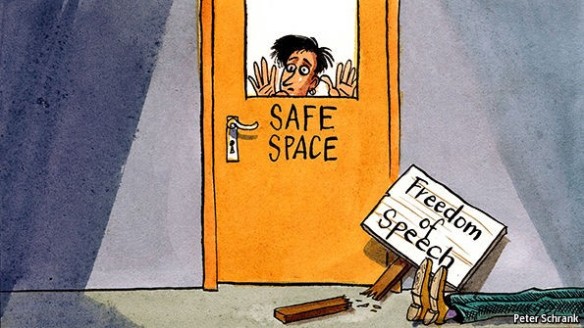
Ladies and gentlemen (if that’s not too harsh and repressive an address for you), we are gathered here today to mourn the death of Open Debate at Wilfred Laurier University. Mr. Debate … Ms.? Zr.? I must make a note to ask how dear old Open would like to be addressed. Moving on … Mr. Debate was an essential part of learning about our complicated world, and furnishing the empty rooms of our minds with all sorts of interesting ideas. One might say that he … Sorry. Zie? They? Oh, sod it. Let’s not talk about Open Debate at all, as we really have no idea how to do it without upsetting people anyway. Perhaps there’s nothing to mourn, as it appears more important to coddle people’s highly tuned sensibilities than to introduce them to any opinion other than the one they already espouse.
Lindsay Shepherd knows all about it. She’s a 22-year-old grad student and teaching assistant. In one of her classes, “Canadian Communication in Context”, she showed an excerpt from a video debate featuring a University of Toronto psychology prof named Jordan Peterson. Peterson inspired controversy last fall when he criticized Bill C-15, which added gender expression and gender identity to the federal human rights act and the Criminal Code. He refuses to use gender-neutral pronouns such as “they”, “zie” and “zher”, which – as one might imagine – further annoys quite a few people. One or more students complained that, by showing the video clip, Shepherd created a “toxic environment”. Not by endorsing Peterson’s views – but by not condemning them. In other words, for neutrally presenting the video – for not taking a position herself in front of the class – Shepherd was labelled “transphobic”, and accused of “cultivating a space” where opinions such as Peterson’s can be “nurtured”. She is now required to submit all lesson plans to her supervisor (Nathan Rambukkana) in advance. He will sit in on her next few classes. She must not submit any more controversial videos of this kind. Rambukkana, told Shepherd that showing the video was akin to “neutrally playing a speech by Hitler“.
I wish I wasn’t regularly required to say things like this, but here goes … Peterson, though boorish, is no Hitler. In comparing Jordan Peterson with Adolph Hitler, Rambukkana makes a stunning leap across the brutal occupation of eleven sovereign nations, the savagely creative murders of six million people, and the ignominy of their desecrated bodies and mass graves. Yes, indeed, openly criticising an Act of Parliament and refusing to use preferred pronouns is exactly the same as the Holocaust. I personally challenge Rambukkana to say this in front of Holocaust survivors and their families. I have a feeling the ensuing debate would be lively – but, in light of what has happened to Shepherd, I probably wouldn’t be allowed to listen to it.
This is, sadly, one of many recent examples of the strangling of free speech and open debate in our universities. Even when freedom of expression and disagreement are allowed to exist, they come with so-called trigger warnings because they might – gasp – bother someone. Universities, once the cradle of objective thought and exchange of ideas, are becoming simply cradles. Sprawling, expensively equipped, beautifully manicured “safe spaces”, where what was once considered challenging is now termed triggering. Where emotionally insulated and stunted people hide behind anonymous complaints to the administration rather than listening to, and learning to intelligently confront, opposing views.
My university days are rapidly fading in the rear view mirror, but two academic experiences come back to me when I think of what happened to Lindsay Shepherd at Wilfred Laurier. One is a debate about GMOs in which I took the part of the widely disliked Monsanto and Frankenfoods – not because I was a fan of the company, but because I was assigned that side of the debate – and we all thought it was important to present all perspectives. Aside from the odd jokey “boo”, people listened to what I had to say – because respect is an important ingredient in the success of a debate. The second is a David Suzuki documentary about the suffering of animals on their way to becoming food in Asia. Scenes ranged from chickens plucked while still alive to live dogs displayed in cages for purchase and consumption to – most disturbing of all – skinned cats held by a metal ring around their necks being boiled alive. Watching those pink, bony bodies floundering weakly, imagining the pain they were undoubtedly feeling, I felt nauseous. I’ve never forgotten the sight. Our ethics prof had made this required viewing. Though he warned us that it was graphic, nobody asked to be excused – again, because we all thought it was important to present all perspectives. The documentary sparked hours of conversation about the experience of animals from farm to table, and what we owe them as keepers and consumers, and how to implement policy changes where needed. What was triggered? Interest. Learning. Debate. Understanding. Personal growth. I believe that I, and my fellow students, emerged from these experiences (and many others) challenged and changed.
This is what university – and learning in general – is for. What will we accomplish if we surround ourselves only with people who agree with us? If we shout down, silence or run from anyone who says things we don’t like, how will we learn enough about them to engage them in meaningful discussion and introduce them to our own perspective? In taking this approach, Wilfred Laurier University is actually harming the community it wishes to protect. If trans people are to be accepted (in more than just law) as ordinary members of society, with all the rights and privileges this entails, we have to dissect and disarm negative perceptions of them. We can’t accomplish that by simply telling naysayers to shut up and go away – and we certainly won’t get there by forcibly suppressing anyone who dares to raise the issue.

